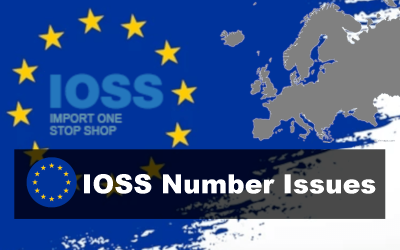Mandatory French Reverse Charge for Import VAT
From 1st January 2022, all VAT on imports to France will be deferred and reported in your VAT return.
From 1st January 2022, the French tax administration have announced that ALL import VAT will be automatically and mandatorily be deferred to the French VAT return under the reverse charge mechanism for tax payers who hold a French VAT number.
This is great news for businesses using France as a clearance hub as this will create a huge cashflow advantage. Instead of paying the VAT on import, the calculated amount will be automatically recorded in their VAT return under the reverse charge mechanism. This means that VAT due will appear automatically on your VAT return by the 14th of the month and be deductible in the same VAT return.
Tax payers who have a French VAT number and import goods through France will benefit from an extended deadline of the 24th of the month to file and pay their taxes. The old deadline was 19th and still exists for those who do not import.
The change comes into place as a result of the competence of import VAT being transferred from the Customs authorities (the DGDDI, standing for Direction Générale des Douanes et Droits Indirects) to the Tax authorities (the DGFiP standing for Direction générale des Finances publiques).
The import VAT reverse charge will be mandatory and automatically applied.
How it currently works
Currently, businesses importing into France will have to pay import VAT and either claim this back through their VAT return or the 13th Directive which can take an extended amount of time (up to 6 months). This creates a cashflow issue for many businesses. Currently, if you wish to defer import VAT in France then you need to request authorisation from the customs authorities and meet the conditions to receive an import license. Once received, you can then reverse-charge the VAT and report this on your VAT return.
The current requirements are:
- non-EU companies have to appoint a customs broker with the AEO (Authorised Economic Operator) status
- The company must have performed at least 4 importations of goods to the EU in the last 12 months
- Have a reliable booking system to record all the import information
- Not have made any serious or repeated offences to the tax and customs regulation for the past 12 months
From the 1st January 2022, all of these conditions will not be necessary.
How are your VAT returns affected in France?
VAT Deadline Extended!
The deadline for filing VAT returns is extended to the 24th for businesses making imports into France
Your French VAT return will be adapted to facilitate the new changes:
- The amount previously reported to the customs authorities will show pre-filled on your VAT return by the 14th day of the month
- The customs authorities will open up a service for you to check the details of the pre-filled import VAT amount appearing on your VAT return
- The deadline for submitting VAT returns in France for importers is extended to the 24th day of the month following the reporting period
The pre-filled amount of import VAT is still the tax payers’ responsibility to check accuracy and can be modified if necessary. The business will also need to obtain the relevant import documents before validating.
Who will be affected by the French import VAT reverse-charge?
All businesses will be affected by the change because the simplification is mandatory for companies with a valid intra-community VAT number in France when importing into the country. If you do not have an intra-community VAT number in France and you are making imports in France, then you will need to apply for VAT registration.
- Businesses subject to the simplified VAT regime (régime simplifié d’imposition or RSI) who make imports in France will need to switch to the regular VAT regime (régime réel normal). Since the update is mandatory, the RSI can no longer be applied to your business.
- If you are subject to a customs and VAT warehouse (régimes fiscaux suspensifs (RFS)) now the tax authority will be the main contact (DGFiP). In consequence, when clearing goods from a customs and VAT warehouse, the tax base – taxable or not, will be declared in the VAT return (information not pre-filled).
Need VAT help?
Our team at VAT Digital are trained to handle your EU VAT registrations and VAT obligations. Get in touch to see how we can help





